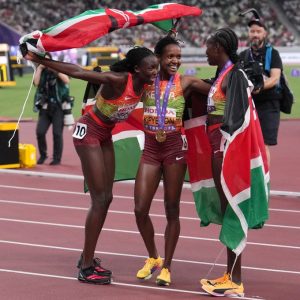Faith Kipyegon yet again turned a 1500m final into a race against the clock rather than the rest of the world at the World Athletics Championships Tokyo 25 on Tuesday (16).
Kipyegon was long ago crowned the queen of middle-distance running and this generational talent merely added to that reputation with yet another global gold.
This was her fourth world title for the event, plus this season she broke her own world record with a time of 3:48.68, not to mention that she is a three-time Olympic champion for the distance.
There were echoes of the night before inside the Japan National Stadium, when 24 hours earlier Mondo Duplantis once again showed he was on another level to his rivals with a world record of 6.30m in the pole vault.
Kipyegon couldn’t match the Swede’s world record achievement – the one she’d set in Eugene in July had already been sensationally quick. And yet her winning time of 3:52.15 was almost three seconds quicker than her compatriot Dorcus Ewoi in second (3:54.92 PB).
Australia’s Jess Hull came away with the bronze in 3:55.16, just edging out the third Kenyan athlete in the field, Nelly Chepchirchir, despite a personal best of 3:55.25 for the latter.
Kipyegon’s time is the second-fastest winning mark at the World Championships. She now owns three of the four fastest winning times in World Championships history.
“After setting the world record in Eugene, I said to myself: ‘I have to go to Tokyo and defend my title’. I knew I could run it under control,” said Kipyegon, who became only the second woman to win four world titles in the same track event after Shelly-Ann Fraser-Pryce, who has won five 100m titles.
“This sport drives me. I won here in 2021 (at the Olympics) just after becoming a mother, so being back here, winning again, means I can show a new gold medal to my daughter. I am taking it one race at a time and the 1500m medal is now in the pocket. I will focus now on the 5000m and try to win it.”
It seems a lifetime ago that Kipyegon finished fifth on her World Championships debut in Moscow in 2013 as a teenager. Her worst place at the World Championships since has been second, but mostly it’s been about the top spot.

It was a silver in Doha which she credits with sparking the remarkable run that has since followed, giving her the belief after the birth of her daughter Alyn that anything was possible on the track. As she put it: “It made me the athlete I am”.
Her grounding for running began on the morning commute to school, run as she did barefoot there and back – 10 miles in all – and she began her competitive running career shoe-less.
In more recent times, her track skills have been honed by Patrick Sang in Kenya’s Great Rift Valley, home to so many of Kenya’s conveyors of talented distance runners, while training alongside the great Eliud Kipchoge, another of Sang’s charges.
She has been winning ever since and, at the age of 31, there are few signs of her slowing. She may not have achieved her aim of breaking the four-minute barrier for the mile this season, but she still ran the fastest ever time by a woman – albeit in an unofficial exhibition event.
In this final, she moved to the front from the off and was never passed, despite Chepchirchir attempting to do so on the last lap but getting nudged out of the way by Hull in the process.
The Australian was the only one capable of going with the world record-holder initially but, by the time she entered the home straight, the race had already been won.
After gold at the Paris Olympics, Kipyegon talked about inspiring the next generation of young girls. On the evidence of Tokyo, she is continuing to do that with aplomb.
By World Athletics











